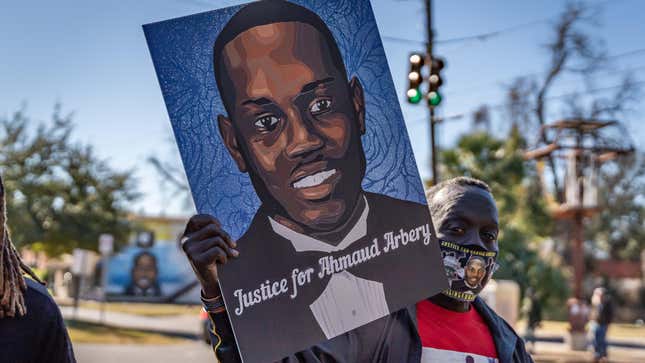
When I learned about slave catcher laws from the Civil War era in my ninth grade U.S. history class, the last thing I expected was to be reading about them being used in a legal battle in the 21st century.
Yet, here we are.
The three white men on trial for killing Black jogger, Ahmaud Arbery, in Feb. 2020 plan on using a repealed citizen’s arrest statute in Georgia as their legal defense.
Father and son, Gregory McMichael and Travis McMichael, along with William “Roddie” Bryan got in their vehicles and chased Arbery as he jogged down a street in Brunswick, Ga. The McMichaels, who were both armed, claimed that they tried to detain the unarmed Black man because they thought he was a burglar, and that Arbery was gunned down in self defense. Arbery’s family believes the men targeted Arbery because he was jogging while Black in a predominantly white suburban neighborhood.
Reuters reports that the 1863 law, which allowed citizens to arrest someone if they suspected the person committed a felony, was repealed in May by Georgia Governor Brian Kemp after public outcry over Arbery’s death.
More from Reuters:
When the fatal encounter occurred on Feb. 23, 2020, it was legal in Georgia for people to arrest someone where they had “reasonable and probable grounds of suspicion” that the person had just committed a felony. Outcry over the killing led to lawmakers revoking the statute in May.
Legal observers say prosecutors will seek to convince the jury that there was no felony over which to arrest Arbery, 25, and that the three men lacked the “reasonable and probable suspicion” required under the old citizen’s arrest law. The trial is in the second week of jury selection.
Before Arbery’s killing, the law had been largely unchanged since it was codified in 1863, when Georgia was part of the slaveholding Southern Confederacy during the U.S. Civil War.
“Citizen’s arrest is a big part of our case, a big part,” Kevin Gough, a lawyer for one of the men, William Bryan, told Reuters. “They changed the law, but changing the law doesn’t affect us. It doesn’t change what was the law of the land at the time.”
Reuters reports that the Georgia chapter of the American Civil Liberties Union said the law was once used by mobs that lynched Black people in more than 500 cases between 1882 and 1968. The law now limits citizen’s arrests to businesses if someone is suspected of theft, and security guards under specific circumstances. Reuters also notes that these kinds of laws are not uncommon and still exist in most U.S. states.
According to The Hill, the three men nearly went free after the shooting. A county prosecutor actually accepted the citizen’s arrest statute as grounds to let the men go. It wasn’t until a cellphone video of the killing, recorded by Bryan, made rounds on social media and led to a closer investigation in May.
From The Hill:
The McMichael’s and Bryan were charged with hate crimes in April. Each was charged with interference of rights and attempted kidnapping, while the McMichael’s received the additional charge of carrying and brandishing a weapon in a violent crime.
The men also face state charges of murder, malice, aggravated assault, false imprisonment and criminal attempt to commit a felony — all three pleaded not guilty to the charges.
Jury selection began in the Arbery case last week. Hopefully, they’ll see the dog whistle that is quite literally a fog horn being used by the defense.

